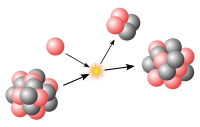This article relies largely or entirely on a single source. (March 2016) |
| Nuclear physics |
|---|
 |
Neutron emission is a mode of radioactive decay in which one or more neutrons are ejected from a nucleus. It occurs in the most neutron-rich/proton-deficient nuclides, and also from excited states of other nuclides as in photoneutron emission and beta-delayed neutron emission. As only a neutron is lost by this process the number of protons remains unchanged, and an atom does not become an atom of a different element, but a different isotope of the same element.
Neutrons are also produced in the spontaneous and induced fission of certain heavy nuclides.